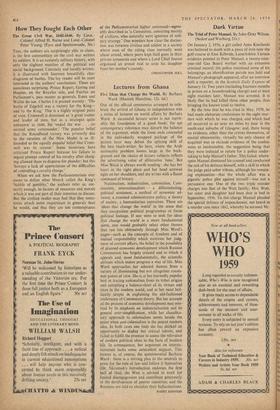Lectures from Ghana
ONE of the official ceremonies arranged to cele- brate the arrival of Ghana to independence was a series of lectures on world affairs by Barbara Ward. A successful lecture series is not inevit- ably the foundation of a good book; the apt contemporary reference may disturb the balance of the argument, while the loose ends concealed in the individually wrapped package of the lecture hour may defeat the splicing skill of the best blurb-writer. So here, where the Arab nationalist problem looms large in the back- ground and the choice of lecture subjects reflects the advertising value of alliterative 'isms.' But Miss Ward is always worth reading : she has her heart in the right place and her head screwed tight on her shoulders, and she writes with a fluent command of history.
Nationalism, industrialism, colonialism, Com- munism, internationalism — a differentiating, political sentiment, a method of economic ad- vance, a resented administrative policy, a theory of society, a humanitarian aspiration. These are 'ideas that change the world' in the sense that they encapsulate political programmes or focus political feelings. If one were to seek for ideas that change the world in a more fundamental sense, one would probably select other themes that rim less obtrusively through Miss Ward's pages—such as the concepts of freedom and of mutual responsibility which motivate her judg- ment of current affairs, the belief in the possibility of planned economic development which Russian Communism has largely created and to which it appeals and, most fundamentally, the scientific attitude which makes progress a way of life. Miss Ward approaches her selected themes from a variety of illuminating but not altogether consis- tent points of view. She is at her learnedly popular best in tracing nationalism from its tribal origins and compiling a balance-sheet of its virtues and vices in the modern world, and at her most bril- liantly simple in explaining the old-fashioned irrelevance of Communist theory. But her account of the process of economic development may mis- lead by its emphasis on industrialisation and its general over-simplification, while her classifica- tory approach to colonialism seems beside the point when anti-colonialism is the potent modern idea. In both cases one feels she has shirked an opportunity to deploy her critical talents, and failed to fulfill the promise to assess the relevance of modern political ideas to the facts of modern life. In consequence, her argument on interna- tionalism lacks sonic antecedent support. This lecture is, of course, the quintessential Barbara Ward : there is a stirring plea to the neutrals to press for the rule of law and follow it themselves (Dr. Nkrumah's Introduction endorses the first half of this); the West is advised to work for limited disengagement and contribute generously to the development of poorer countries; and the Russians are told to abandon their hallucinations.
HARRY JOHNSON


































 Previous page
Previous page